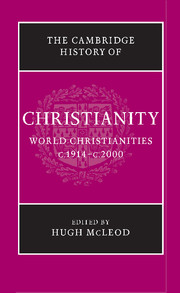Book contents
- Frontmatter
- 1 Introduction
- 2 Being a Christian in the early twentieth century
- PART I INSTITUTIONS AND MOVEMENTS
- PART II NARRATIVES OF CHANGE
- PART III SOCIAL AND CULTURAL IMPACT
- 26 Liturgy
- 27 The ‘other’
- 28 Wealth and poverty
- 29 Male and female
- 30 Christianity and the sciences
- 31 Literature and the arts
- 32 Role models
- 33 Being a Christian at the end of the twentieth century
- Bibliography
- Index
- References
30 - Christianity and the sciences
from PART III - SOCIAL AND CULTURAL IMPACT
Published online by Cambridge University Press: 28 March 2008
- Frontmatter
- 1 Introduction
- 2 Being a Christian in the early twentieth century
- PART I INSTITUTIONS AND MOVEMENTS
- PART II NARRATIVES OF CHANGE
- PART III SOCIAL AND CULTURAL IMPACT
- 26 Liturgy
- 27 The ‘other’
- 28 Wealth and poverty
- 29 Male and female
- 30 Christianity and the sciences
- 31 Literature and the arts
- 32 Role models
- 33 Being a Christian at the end of the twentieth century
- Bibliography
- Index
- References
Summary
There is a widespread assumption that the late nineteenth century was a period in which the conflict between science and religion moved into the open, with materialistic scientists openly bidding to replace Christianity as a source of cultural authority. The twentieth century then appears as an era in which the churches attempted to fight back, denying science’s claim to have explained away the mysteries of the cosmos and the human spirit. Even if religion as a whole was in decline (at least in Europe), the specific challenges offered by the materialist view of nature were identified more clearly and alternative visions offered that would blunt science’s ability to undermine faith.
In fact the story of the relationship between Christianity and the sciences in the twentieth century is a good deal more complex than this simple image of conflict would imply. Historians of the nineteenth century itself have noted how the image of a necessary confrontation between science and religion was deliberately manufactured by the advocates of materialism or (as T. H. Huxley would have preferred to call it) scientific naturalism. As James R. Moore has noted, this image derives from late nineteenth-entury writers such as J. W. Draper and A. D. White, both of whom endorsed the argument that science was wresting authority from religion. Paradoxically, the image of late nineteenth-century culture as dominated by science-inspired materialism was consolidated by the later opponents of that movement, who presented themselves as challenging an entrenched dogma.
- Type
- Chapter
- Information
- The Cambridge History of Christianity , pp. 569 - 581Publisher: Cambridge University PressPrint publication year: 2006



